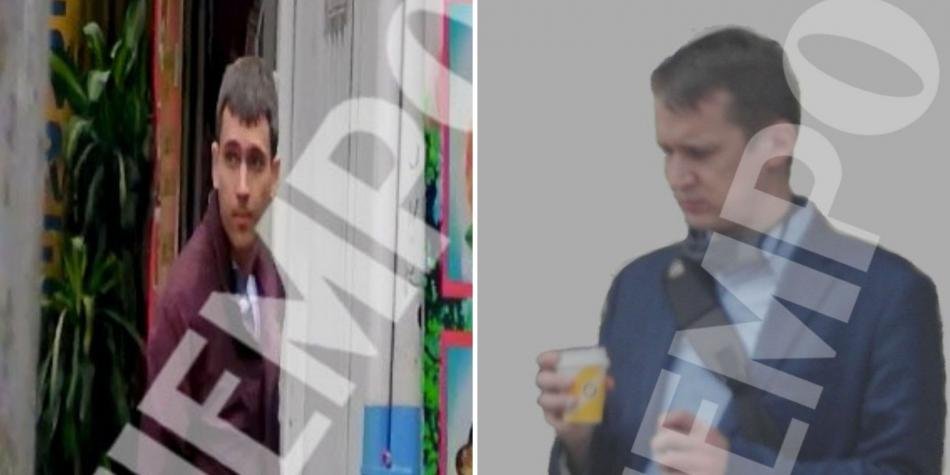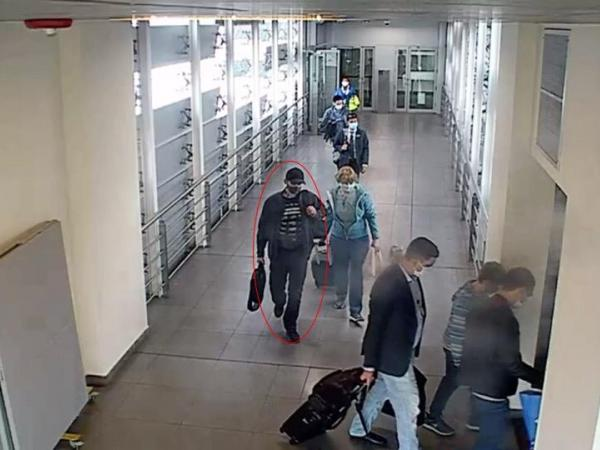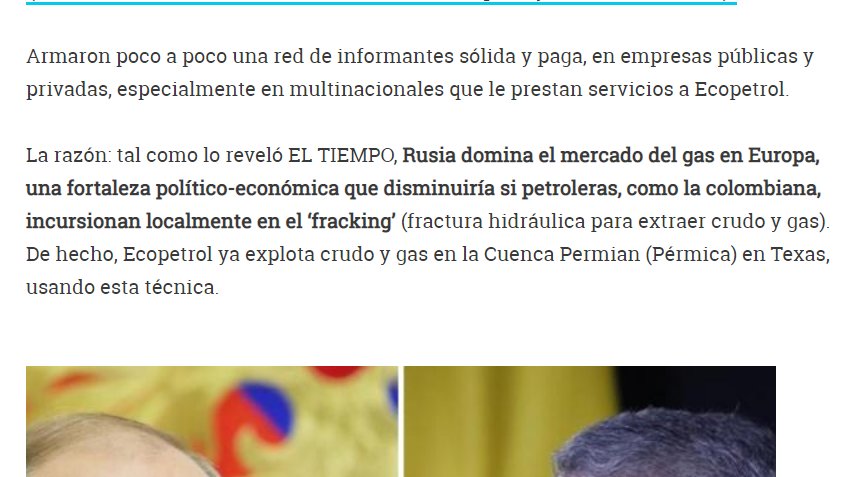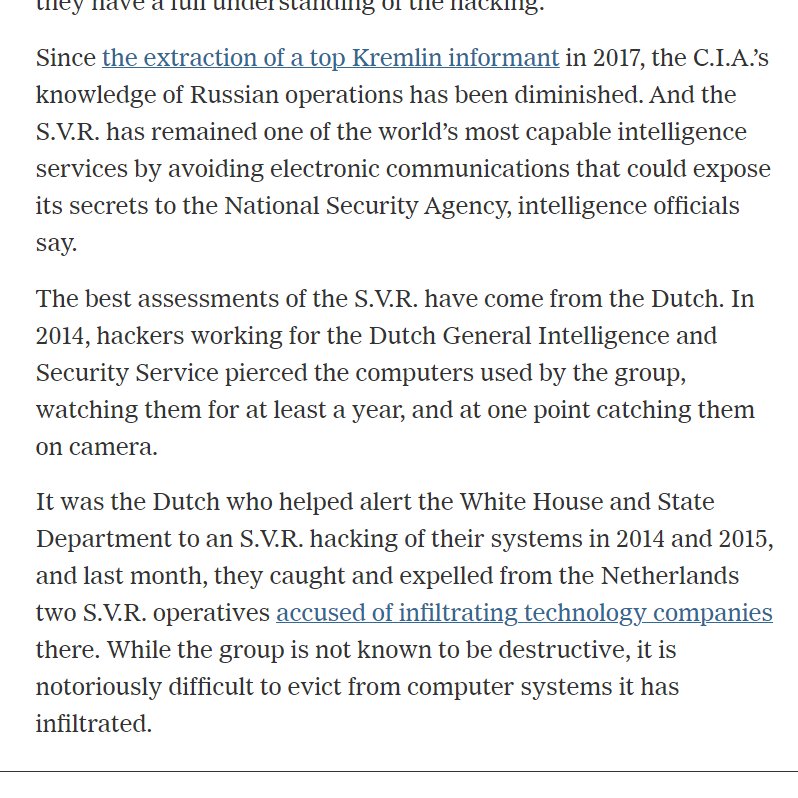Not sure if anyone is tracking the number of Russian intelligence officers who have been declared persona non grata recently, so I'll go ahead and start a thread. Colombia PNG'd two Russian officials earlier this month for recruiting agents in Cali.
themoscowtimes.com/2020/12/23/col…
themoscowtimes.com/2020/12/23/col…
The two Russian officers, Alexander Paristov and Alexander Belousov, reportedly worked for the SVR and GRU, respectively, and were interested in "Colombia’s energy industry and mineral commodities". 2/
Last week, Bulgaria PNG'd a Russian military attaché "seeking sensitive military information, including on the number of U.S. troops deployed in Bulgaria during military drills". He was the 6th Russian official expelled by Bulgaria since October 2019. 3/
reuters.com/article/us-bul…
reuters.com/article/us-bul…
That attaché was "Colonel Vasiliy Sazanovich, who had allegedly been coordinating Russia’s military intelligence spy network in Bulgaria." (@alexrblackwell) 4/
apnews.com/article/collec…
apnews.com/article/collec…
The Netherlands PNG'd two Russian officers, including an SVR officer, earlier this month who were seeking info "about artificial intelligence, semiconductors and nanotechnology. Many of these technologies have both civilian and military applications.” 5/
reuters.com/article/nether…
reuters.com/article/nether…
Austria PNG'd a Russian official back in August reportedly for economic espionage "for years the Russian had engaged in spying on an Austrian high-tech company with the support of an Austrian working at the firm." 6/
reuters.com/article/us-rus…
reuters.com/article/us-rus…
Notably, Austria convicted a former colonel in June for passing on "secret information about the Austrian military’s weapons systems and artillery positions between the years 1992 and 2018, in exchange for about €280,000 (£250,000)." 7/
theguardian.com/world/2020/jun…
theguardian.com/world/2020/jun…
Norway expelled a Russian official in August, possibly the same officer who was caught meeting with a Norwegian national who was arrested for espionage and "led a joint industry project on 3D printing" at a Norwegian company. 8/
apnews.com/article/3f425d…
apnews.com/article/3f425d…
The Czech government expelled two Russian officials in June who were reportedly involved in infighting in the embassy "with one of them sending made-up information to our (counterintelligence service) about a planned attack on Czech politicians" 9/
reuters.com/article/us-cze…
reuters.com/article/us-cze…
Slovakia expelled 3 Russian officials in August for espionage and visa abuse. The Slovakian PM Igor Matovic said, "The Russians are our Slavic brothers, and Russia is our trading partner. But Slovakia is a sovereign state, not a banana republic.” 10/
bloomberg.com/news/articles/…
bloomberg.com/news/articles/…
Greece expelled two Russian embassy officials and banned another two from entering the country in 2018 for attempting to foment opposition to Macedonia's name change, which paved the way for NATO membership. 11/
ekathimerini.com/230551/article…
bbc.com/news/world-eur…
ekathimerini.com/230551/article…
bbc.com/news/world-eur…
Germany PNG'd two Russian officials in December 2019 in response to the murder of Zelimkhan Khangoshvili in Berlin's Tiergarten park. 12/
bbc.com/news/world-eur…
dw.com/en/russia-expe…
bbc.com/news/world-eur…
dw.com/en/russia-expe…
In response to the Skripal poisoning, more than 150 Russian officials were expelled in 2018 by at least 29 countries as well as NATO, including 60 from the US (12 from New York and 48 from DC). 13/
bbc.com/news/world-asi…
cnbc.com/2018/03/27/rus…
bbc.com/news/world-asi…
cnbc.com/2018/03/27/rus…
In May 2019, Sweden refused to renew a visa for a Russian official and "declined Russian applications for diplomatic visas" after arresting a Swedish man "on suspicion of spying and of having been recruited as an agent by a Russian intelligence officer"14/
reuters.com/article/uk-rus…
reuters.com/article/uk-rus…
Russia expelled a Polish diplomat in April 2019 in response to Russia's deputy consul in Poznan being expelled that year by Poland. 15/
apnews.com/article/e072bd…
apnews.com/article/e072bd…
In August 2019, Ukraine PNG'd a Russian official from the consulate in Lviv for recruiting a man who collected information on political figures, Ukrainian military units, law enforcement and intelligence agencies, and foreign military instructors. 16/
tass.ru/mezhdunarodnay…
tass.ru/mezhdunarodnay…
16 Russian intelligence officers have been declared persona non grata in 2020:
-Colombia: 2
-Bulgaria: 5 (a 6th in October 2019)
-the Netherlands: 2
-Austria: 1
-Norway: 1
-Czechia: 2
-Slovakia: 3
17/
novayagazeta.ru/articles/2020/…
-Colombia: 2
-Bulgaria: 5 (a 6th in October 2019)
-the Netherlands: 2
-Austria: 1
-Norway: 1
-Czechia: 2
-Slovakia: 3
17/
novayagazeta.ru/articles/2020/…
We could also see some further expulsions regarding the French lieutenant-colonel who was arrested in August and is suspected of spying on behalf of Russia while working at a NATO facility in Italy. 18/
theguardian.com/world/2020/aug…
bbc.com/news/world-eur…
theguardian.com/world/2020/aug…
bbc.com/news/world-eur…
Alekandr Paristov and Alekandr Belousov, the two Russian intelligence officers PNG'd from Colombia who were accused of buying information on strategic issues, including mineral resources, electricity grids, oil infrastructure and hydroelectric plants. 20/
eltiempo.com/unidad-investi…

eltiempo.com/unidad-investi…


El Tiempo reports that Colombia has been tracking unusual activities since 2017, and that 23 members of Russia's embassy in Bogota who have arrived since mid 2016 have atypical profiles. They have developed a network of informants from public and private companies. 21/
In particular, they targeted informants at companies that worked with Ecopetrol, its largest petroleum company, reportedly because Russia dominates Europe's natural gas market, and is concerned that Colombia might invest in fracking and threaten Russia's market share. 22/ 

El Tiempo also reports that Russian intel officers focused on the energy/technology sector, but also inquired about the political and military topics, too. They report that the increase in Russian intel officers happened along with an unusual increase in Russian tourists. 23/
Apparently, Colombia is investigating whether Belousov, one of the two Russian officers who was PNG'd, was also one of the 35 officers expelled from the US by the Obama administration after the 2016 election interference. (h/t @AbraxasSpa) 24/
eltiempo.com/unidad-investi…
eltiempo.com/unidad-investi…

Russia attracted attention after asking to conduct a humanitarian flight in June for Russian nationals out of the country because of COVID. The flight was done by a Venezuelan airline and several of the Russians "tourists" were in cities not included in tourist packages. 25/
El Tiempo suggested that Venezuela may have played a role in aiding the Russian officers, and that US and UK intel services helped ID some of these officers and tipped off Colombia about encrypted messages being sent to the Kremlin. 26/
eltiempo.com/unidad-investi…
eltiempo.com/unidad-investi…
Apparently, some of this encrypted information was about operations in Colombia but also about other countries and intel services. Paristov, the SVR officer, was detected first and Belousov, the GRU officer, was discovered later. 27/
Colombia's intelligence agencies also tracked one of the officers, who was relieved in 2019, and watched as a new, more senior intelligence officer who replaced him took over his network of agents. 28/
"A Swedish tech consultant has been charged with espionage for allegedly selling information about truckmaker Scania and Volvo Cars to Russia that put Sweden's security at risk, prosecutors said on Monday." 29/
themoscowtimes.com/2021/02/22/swe…
themoscowtimes.com/2021/02/22/swe…
Thread on the arrest of several Bulgarian military officers suspected of spying on behalf of the Russian intelligence services. 30/
https://twitter.com/christogrozev/status/1372855828949139456
Bulgarian Prime Minister Boyko Borissov told reporters that he will once again have to declare Russian embassy officials persona non grata because of espionage. Bulgaria has expelled 6 Russian officials since October 2019. 32/
ria.ru/20210320/diplo…
ria.ru/20210320/diplo…
With these expulsions, Bulgaria has now expelled 8 Russian intelligence officers from their embassy in Bulgaria since October 2019. 34/
https://twitter.com/christogrozev/status/1374011344698142720
At least 16 Russian intelligence officers were PNG'd in 2020. Now 4, two in Italy and two in Bulgaria, have been PNG'd so far in 2021. 36/
https://twitter.com/georgikantchev/status/1377265902933180422
It seems the Italian naval officer agreed to provide classified information to Russian intelligence officers because of financial problems. 37/
bbc.com/news/world-eur…
bbc.com/news/world-eur…

The FBI says that the United Engine Corporation's (ODK) director of marketing and sales was an active SVR officer. Western sanctions have arguably been most damaging to civilian products from Russia's defense industry, such as the MC-21 passenger jet. 38/


https://twitter.com/Mike_Eckel/status/1378086446096117766


The 2 main Russian passenger jets, the SSJ100 and MC-21, were designed with a high % of foreign components. The MC-21 is still in development, and its 1st engines were from Pratt & Whitney while the PD-14 faced delays. This case indicates that sanctions have been a problem. 39/
Reuters reports that the US will expel around 10 Russian officials along with new sanctions in response to the SolarWinds cyber espionage case. 40/
reuters.com/article/idUSKB…
reuters.com/article/idUSKB…
• • •
Missing some Tweet in this thread? You can try to
force a refresh





















